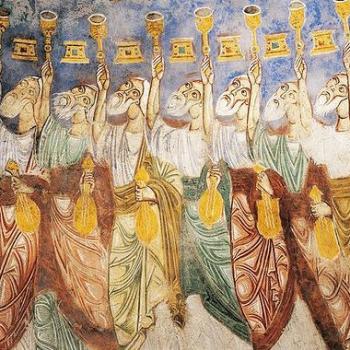Should A Christian Be President of the United States?
According to news reports, a candidate for the Republican nomination for president of the United States was asked whether a Muslim should be president of the United States and he responded that he did not think so. Later, according to other news reports, he “clarified” that he meant that the American people are not ready for that.
I immediately thought of Martin Luther’s comment that he would rather have a competent “Turk” as prince than an incompetent Christian. In other words, for Luther, one’s religion does not matter to how well he or she leads a nation-state; what matters is how competent he or she is to lead. (In Luther’s time “Turk” was virtually synonymous with “Muslim.”)
As I see it, whether a Muslim would make a good president of the U.S. depends on whether he or she is committed to the U.S. Constitution and our form of government. There are many kinds of Muslims in the world and in the U.S. Simply to make a blanket statement about Muslims’ qualifications to be president displays ignorance and bias.
I’m more interested, however, in the question of whether a Christian should be president of the United States—or any nation-state.
First, here in the U.S., I know of many Christians I would not want to be president. Two kinds come to mind: Christians who think only Christians should hold public office and Christians who are pacifists. (This is discounting those who, like many others, are simply not qualified due to ignorance and/or lack of public service leadership experience.)
A pacifist should not be president because being president makes one the Commander in Chief of the Armed Forces and occasionally requires use of deadly force.
A person who thinks only Christians should hold public office stands in blatant contradiction to the Constitution of the United States and therefore cannot support it—as a U.S. president must.
But my most troubling question is whether a true Christian, a person committed to the way of Jesus Christ, one who puts first and above all else the Kingdom of God and God’s righteousness, should ever lead a modern nation state.
My own study of U.S. presidents leads me to believe the U.S. has had only one such person as president—Jimmy Carter. We have, of course, had many presidents who claimed to be Christians. In fact, probably all have claimed that. But, of course, as a favorite evangelical Christian saying goes, just being in a garage does not make one a car. And so just being a church member or even attender does not make one a true Christian.
Jimmy Carter made no secret of having been “born again.” And it would be difficult for anyone to claim that he was being insincere in that claim (e.g., just to garner the “evangelical vote”). At the time of his election there was no “evangelical block” of voters. The “Religious Right” arose after Carter’s presidency. Many evangelical Christians did vote for him because he was “one of us,” but many of them turned against him and voted for Reagan to replace him.
I believe three things about Carter (and perhaps more). First, he really was and still is a genuine Christian, a man who believes in his heart of hearts that Jesus Christ is God and Savior and who has been born again (made a personal decision for Christ) and second, who did his best even as president to put first the kingdom of God and God’s righteousness. Third, he was not a good president partly because he was an authentic Christian.
Personally, I doubt one can be committed to God’s “upside down kingdom” where the first are last and the last first, where the weak and powerless are lifted up, where justice and mercy come together, and where lying is forbidden as is catering to the powerful and wealthy, and be president of any modern nation state. Carter gave it his best try; he failed.
I remember very well when Carter publicly announced that the U.S. would no longer support dictators, even in our “sphere of influence,” just because they were anti-communist. At that time the U.S. was still pouring money into the coffers (Swiss bank accounts) of many vicious dictators around the world. The U.S. government had a military training facility where it trained people of other countries to kill dissidents. Carter announced that the U.S., under his leadership, would consider the human rights records of governments before giving them aid even if they were staunchly allied with the U.S. in “fighting communism.” This was at least a step toward renouncing “realpolitik”—the prevailing unofficial policy of the U.S. government with regard to supporting governments especially in so-called Third World countries.
Recently Jimmy Carter announced that, in his view, the U.S. is really led by an oligarchy—a network of closely related (though not by blood) families and corporate “fat cats” who have little interest in the weak, the poor and even in the middle class. That may be hyperbole, but I tend to think there is some truth in it. At least the U.S. is in danger of going there. A recent candidate for president of the U.S. was secretly taped telling his wealthy supporters that they, not the majority of Americans, would be his constituents if he were elected president. I suspect he was just saying out loud what every person elected to public national office knows has to be true. The only way to get elected to national public office seems to be to cater to the wealthy and powerful leaders of major industries and corporations who filled his or her campaign coffers with money. Of course they expect to be catered to.
I am not cynical, but neither am I naïve. America is no longer a true democracy; it is run by corporations and the super-rich elite. Occasionally they don’t get their way, but, for the most part, they do. One reason they do not seem to is that they do not agree among themselves about everything. So, sometimes, a president, a senator, a congressman, has to choose between them in decision-making. But, in the end, the policy remains that “What’s good for business is good for America” even when what’s good for business is bad for the working poor (to say nothing of the destitute).
No, given how modern nation states work, I do not think a real Christian, a true disciple of Jesus Christ who seeks to put first the kingdom of God and God’s righteousness, can be president of the United States or any modern nation state.
















